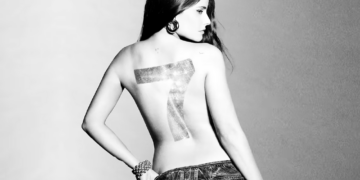The #MeToo movement may have ushered in a year of female empowerment where voices of women against sexual oppression were heard loud and clear, but when it comes to women in positions of power, there is still much progress to be made.
Take a recent article by Forbes, which brings to light some rather grim statistics: “When we look at the percentage of women in senior leadership roles, this has remained even lower at 22 percent in 2018. A report by Catalyst says that women in the Fortune 500 now make up 14.6 percent of executive officers, only 8.1 percent of the highest paid and under five percent of CEOs.”
In the religious world, women are fighting a similarly uphill battle. In America, roughly 20% of non-Orthodox Rabbis are women.
In 2016, the US saw its first Orthodox female rabbi. “Canadian-born Lila Kagedan became the first Orthodox woman to adopt this once exclusively male title. Other female graduates of this progressive New York-based yeshiva have taken other titles, such as “rabba” (the female of rabbi) or “maharat,” but none have dared push the envelope as far as Kagedan in using ‘rabbi,’” Haaretz reported.
As such, although much has improved in the United States since Sally Priesand became the first woman ordained as a rabbi by a Jewish seminary, there is still much work to be done.
The Orthodox Union, for example, “established parameters for a three-year period during which the umbrella body for American Orthodox congregations will work to bring its member synagogues who employ female clergy into compliance with OU standards, which stipulate that a woman cannot serve as a rabbi,” JNS reported.
“While the ordination of female rabbis is accepted by Reform and Conservative Judaism and is not a controversial issue in those movements, the debate on women clergy has long been the source of heated disagreements within the Orthodox community,” it added.
So much so, in fact, that the Rabbinic Council of America issued a proclamation banning female rabbis, citing that they violate long-held tradition.
However, cracks in the glass ceiling are beginning to emerge. In Israel, for example, the Rabbinate has launched a program called Maayan, which trains ten outstanding women to be educational leaders in their communities.
And the country’s Women of the Wall Movement, which advocates for prayer at Jerusalem’s Western Wall, was mired in controversy when the group first formed. Protests and arrests were common when the women prayed at the Kotel while wearing prayer shawls traditionally reserved for men, but after a Supreme Court ruling stated that these gatherings are not illegal, the dramatic confrontations subsided.
Although this topic lies outside the mission of the International Fellowship of Christians and Jews (The Fellowship), the controversy cannot be ignored. The Fellowship is run by an Orthodox Rabbi (Rabbi Yechiel Eckstein) and helps support of women in need. The Fellowship also works to empower women.
In addition to funding programs that invest in Israel’s women – such as supporting education initiatives for young female immigrants and shelters for battered women – The Fellowship’s Global Executive Vice President, Yael Eckstein, is an Eshet Chayil (Woman of Valor) herself.
As a working mother who does much to drive fundraising for the Fellowship’s impressive $140 million per year donation basket, she exemplifies a leader in the Jewish world with a strong vision.
“No matter what I’m doing, I try to be present where I am. We have to put intention to what we’re doing,” she said in Facebook post dedicated to advice she had for other working mothers.
Her father, Rabbi Eckstein, has also been commended for his efforts to empower women.
In 2016, the Women’s International Zionist Organization (WIZO) awarded Eckstein and his wife, Joelle, the Joseph Handleman Light of Philanthropy Award.
“Therein lies the deep connection between WIZO and Rabbi Yechiel and Joelle Eckstein,” WIZO officials said in announcing the award. “With grace and distinction, they exemplify those who work tirelessly to obtain a Zionistic, humanistic Israeli society based on equal opportunities, focused on education and welfare for women, children and youth, in cooperation with the Jewish Diaspora.”
The Fellowship prides itself on being a bridge builder between Jews and Christians – and Catholic Christians also experience similar controversy regarding women wishing to enter the priesthood. Pope John Paul II’s 1994 apostolic letter Ordinatio Sacerdotalis, known in English as “On Reserving Priestly Ordination to Men Alone,” spelled out the Catholic church’s objection to ordaining women quite clearly.
“He used the now well-worn reasons: Jesus chose only men as his Apostles; the exclusion of women from the priesthood is in accordance with God’s plan; the role and presence of women in the church, ‘although not linked to the ministerial priesthood, remain absolutely necessary and irreplaceable,’” Jamie Manson who received her Master of Divinity degree from Yale Divinity School, wrote in the National Catholic Reporter.
But like the struggle among Orthodox Jewry, “Women’s ordination is about so much more than simply making women Catholic priests. At its heart, it is a movement to convince one of the largest and most influential religious organizations in the world to lift up women globally as truly equal to men,” Manson argued.
That said, in other Christian traditions, that tide has begun to rapidly change. The Religion News Service reported this year that “the share of women in the ranks of American clergy has doubled — and sometimes tripled — in some denominations over the last two decades.”
If this trend in both religions continues, it is hard to imagine the controversy around this subject lingering in the decades to come.







